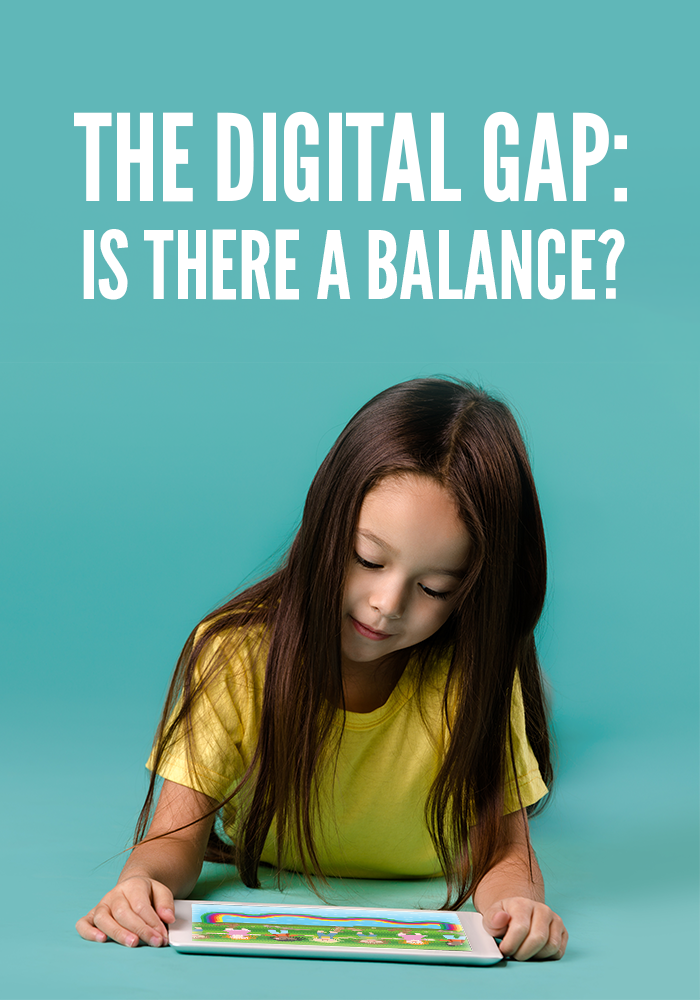The Digital Gap: Is There a Balance?

In an article in The New York Times entitled “The Digital Gap Between Rich and Poor Kids Is Not What We Expected” Nellie Bowles argues that “America’s public schools are still promoting devices with screens — even offering digital-only preschools” while “the rich are banning screens from class altogether.” Bowles reports on a study from Common Sense Media which found that “lower-income teenagers spend an average of eight hours and seven minutes a day using screens for entertainment, while higher income peers spend five hours and 42 minutes.”
Parents say there is a growing technological divide between public and private schools even in the same community. [. . .] While the private Waldorf School of the Peninsula, popular with Silicon Valley executives, eschews most screens, the nearby public Hillview Middle School advertises its 1:1 iPad program.
Nellie Bowles reminds us that “it wasn’t long ago that the worry was that rich students would have access to the internet earlier, gaining tech skills and creating a digital divide.” She writes that now “it could happen that the children of poorer and middle-class parents will be raised by screens, while the children of Silicon Valley’s elite will be going back to wooden toys and the luxury of human interaction.”
Hands-on Learning
At Demme Learning, we fully encourage hands-on learning and play structured around “old-fashioned” toys like lincoln logs and LEGO.
In an earlier post, I reviewed The Design of Childhood (Alexandra Lange) which explores this kind of play in detail.
One of the reasons that Lange is such a fan of kids playing with blocks is that this kind of play provides opportunity for imagination and creativity. In lovely prose, she explains that ‘many of our longest-serving toys have no baked-in narrative. Simple shapes and sturdy materials encourage free play and meet the child at her level. She may get in the box, color the box, cut the box, stack her box with a friend’s.’ I really like this language of toys that do not stifle the imagination with “baked-in narratives:” I get the sense that when parents bemoan “electronics” what they are really rebelling against is the (very wrong) idea that kids can only entertain themselves when the toys they are playing with give them explicit parameters for that play.
Technology
Nevertheless, we also love technology, which is why we are really excited about our math manipulatives app and our new digital toolbox. Likewise, Lange is not opposed to video gaming. As I noted in my review: “Lange sees games like Minecraft, which is literally a block-building game, as being analogous to physical block play. For example, she writes that ‘today the sandbox is as likely to be the rectangular space of the computer screen, where digital sand, in the form of Minecraft cubes or Scratch block commands, are used to explore building, civilizations, and geography.’”
One of the more lighthearted portions of the New York Times article I quoted above is the story of the mom whose son’s Christmas list was “a Wii, a PlayStation, a Nintendo, a MacBook Pro and an iPhone.” That mom responded, “Kiddo, you’re not gonna get one of those things…Yeah, I’m the mean mom.” This reminds me of the times when my parents would make me put away my Game Boy Advance SP (nineties kids know what I’m talking about, lol) to play outside or read a book. Speaking of “mean” parents, check out this funny parody that the Holderness family made about unplugging the video game consoles in preparation for going back to school. (And honestly, why would you play Fortnite when you could play Super Smash Brothers Melee instead???)
Further Reading
In my blog post Risky Play: A Need of The Soul I explore the insight of the French philosopher Simone Weil on our need for risk, the American Academy of Pediatrics on the importance of childhood play, and CityLab on the emergence of “adventure playgrounds.”
Ethan Demme, CEO of Demme Learning, has a helpful review of the book The Tech-Wise Family by Andy Crouch. Ethan explains that “Crouch isn’t afraid of technology, but he is concerned about potential pitfalls.”
